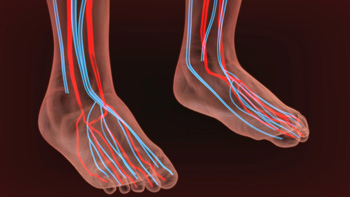

Poor circulation, or peripheral arterial disease, occurs when blood flow to the extremities, particularly the feet, is reduced due to narrowed or blocked arteries. This condition often results from atherosclerosis, where fatty deposits build up on artery walls, or from other factors like diabetes, smoking, or high blood pressure. When circulation is compromised, the feet may not receive enough oxygen and nutrients. Common signs include cold feet, numbness or tingling. Cramping, discoloration, slow-healing sores, and in severe cases, tissue damage or infections are other signs. These symptoms can affect mobility and increase the risk of serious complications, such as ulcers or gangrene. If you suspect poor circulation, it is strongly suggested that you visit a podiatrist who can assess your condition, recommend treatments like compression therapy, lifestyle changes, or medication, and help prevent further complications.
While poor circulation itself isn’t a condition; it is a symptom of another underlying health condition you may have. If you have any concerns with poor circulation in your feet contact Dr. Robert Hope of Riverside Podiatry. Our doctor will treat your foot and ankle needs.
Poor Circulation in the Feet
Peripheral artery disease (PAD) can potentially lead to poor circulation in the lower extremities. PAD is a condition that causes the blood vessels and arteries to narrow. In a linked condition called atherosclerosis, the arteries stiffen up due to a buildup of plaque in the arteries and blood vessels. These two conditions can cause a decrease in the amount of blood that flows to your extremities, therefore resulting in pain.
Symptoms
Some of the most common symptoms of poor circulation are:
Treatment for poor circulation often depends on the underlying condition that causes it. Methods for treatment may include insulin for diabetes, special exercise programs, surgery for varicose veins, or compression socks for swollen legs.
As always, see a podiatrist as he or she will assist in finding a regimen that suits you. A podiatrist can also prescribe you any needed medication.
If you have any questions, please feel free to contact our office located in Tuscaloosa, and Fayette, AL . We offer the newest diagnostic and treatment technologies for all your foot care needs.